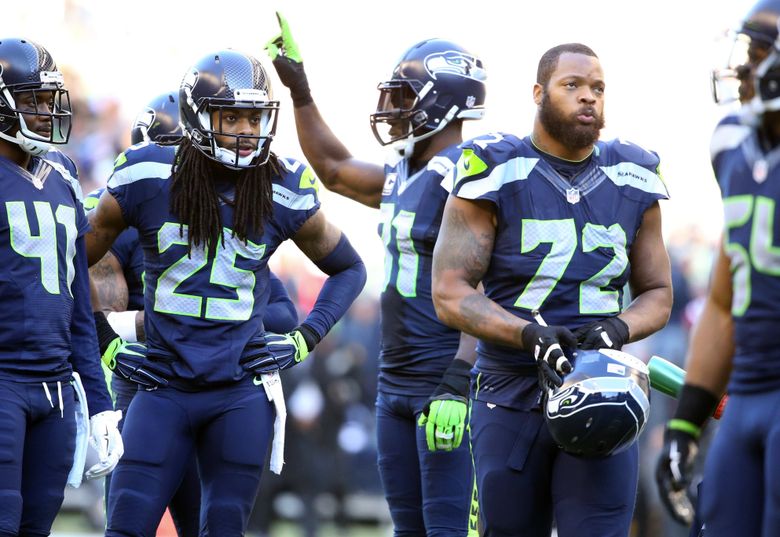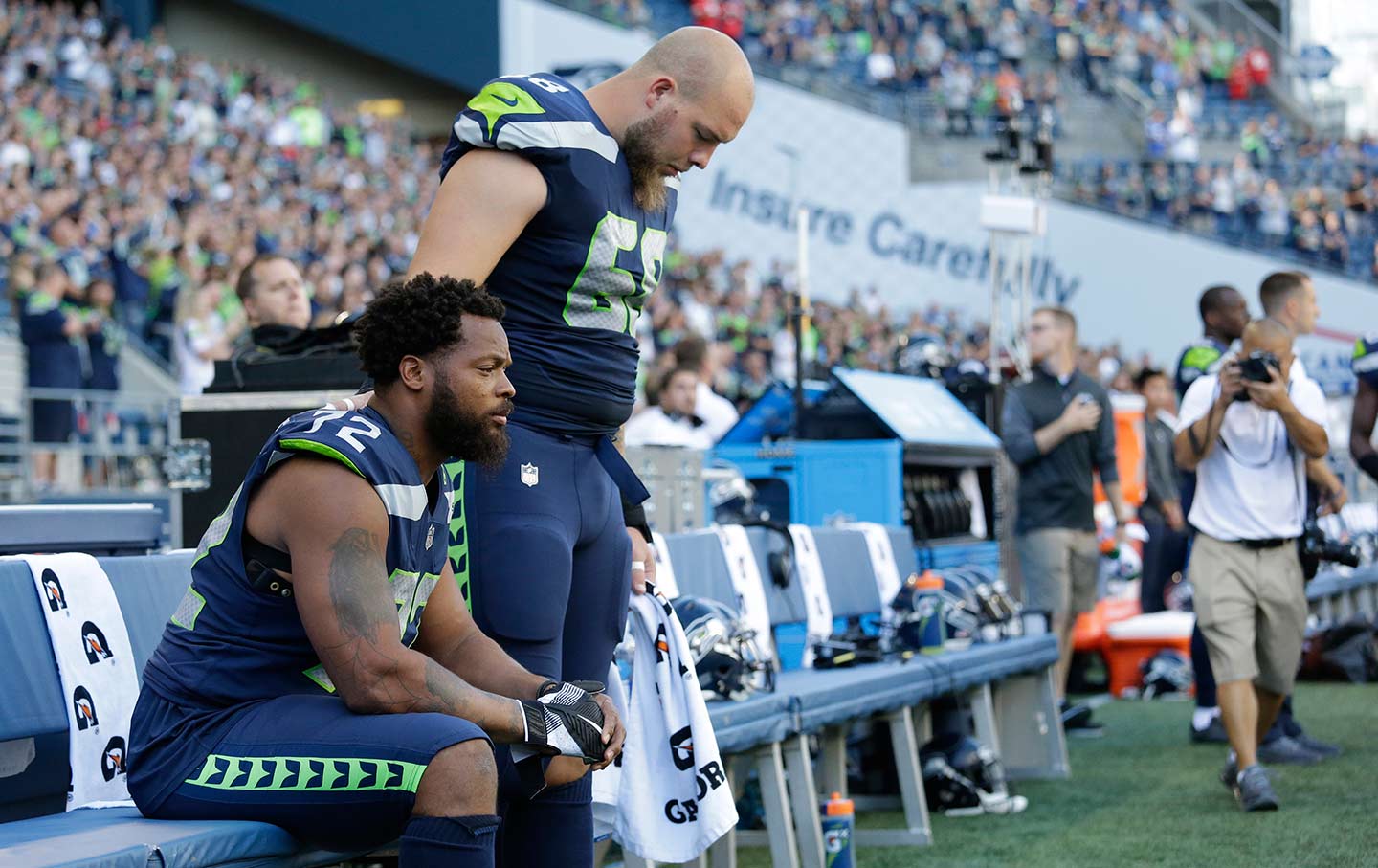 |
| The Seahawks just jettisoned All-Pro cornerback Richard Sherman & Pro Bowl defensive end Michael Bennett (Credit: Seattle Times) |
Trading Michael Bennett for nearly nothing makes no sense.
Cutting Richard Sherman makes even less sense.
In addition to degrading roster talent, these personnel decisions eliminate long-established locker room leaders, imperil team identity and morale, and threaten the winning legacy of Coach Pete Carroll.
In nine years with the team, Carroll worked with General Manager John Schneider to build the best defense in team and league history. Through good drafts, inspired recruiting, and careful talent development, they erected an enduring defensive bulwark that allowed fewer points than every other NFL team for an impressive five-year run from 2012-16.
Last year, injuries decimated Seattle defenders, causing the unit's performance to plummet from excellent to just slightly above average.
To their credit, Carroll and Schneider are willing to take bold action restore the team's defensive dominance.
It began with firing defensive coordinator Kris Richard.
Now it continues with a purge of veteran players.
Last year's injury plague hit long-tenured defenders especially hard. Pro Bowl defensive end Cliff Avril and All-Pro strong safety Kam Chancellor sustained serious, potentially career-ending neck injuries.
Early in November, Sherman tore his Achilles--an injury from which some players never fully recover.
Carroll and Schneider have evidently decided to jettison the aging nucleus of our defense before further injuries compromise the unit's performance.
But you don't upgrade the best fortress in league history by demolishing a load-bearing wall and dynamiting the cornerstone at the same time.
Michael Bennett, a Load-Bearing Wall
This is unusual. Defensive linemen have uniquely difficult jobs. They are big men who every down must push through or run around even bigger men (offensive linemen), and then chase and tackle fleeter and more agile men (running backs and quarterbacks). Because this is such exhausting work, most teams rotate defensive linemen consistently to let them catch their breath and keep their legs fresh. Consequently, most starting NFL defensive linemen play less than 60% of their team's defensive snaps.
But not Bennett. The Seahawks have hyperexploited that man since 2014, forcing him to play more than 80% of the team's defensive snaps for four straight seasons.
Last year, Seattle accelerated the hyperexploitation with callous disregard for Bennett's advancing age. At 32 years old, and despite a lingering heel injury, the team made Bennett play 84.7% of Seattle's defensive downs. Only five defensive linemen in the entire league played more downs in 2017, and their average age was 28.
How did Bennett respond to this increasingly brutal regime of hyperexploitation? By playing hard. Every down. Without complaint. By consistently disrupting opposing offenses, and making three Pro Bowls.
There is a cold, actuarial argument for ditching Bennett. Although his body has betrayed no outward signs of breaking down, no man could forever endure what Seattle has been doing to Bennett.
If Carroll and Schneider are right that Bennett is due to lose a step, then a 5th-round pick and a reserve wideout could represent good value for him
But if they're wrong--if Bennett remains capable of playing at a high level--then Seattle just gave away a great talent to our conference rivals, the defending Super Bowl champions.
Moreover, why would the NFL's best athletes want to play for Seattle if we develop a reputation as a team that cynically uses up players and then callously discards them?
The saddest aspect of the Bennett trade is the suspicion that the team may be ousting him for his activism.
 |
| Bennett sitting during the national anthem with the support of center Justin Britt (Credit: The Nation) |
Bennett angered many by sitting during the national anthem. He did this to express concern over racial injustice, and to show support for Colin Kaepernick, a starting-caliber quarterback apparently blacklisted by NFL teams in 2017 as punishment for his 2016 anthem protests.
I admired how Carroll publicly supported Bennett's freedom of expression. I appreciated Justin Britt's decision to show support for Bennett and the teammates who joined him on the bench. I rejoiced when our generally progressive city and region embraced or at least respected Bennett's activism--in stark contrast to many less enlightened NFL fan bases, which evidently believe that black men forfeit free speech when they sign on as professional athletes.
So, it is disappointing to think the Seahawks may have traded Bennett to rid the team of his activism.
(In my own work as a public educator, I often encounter people who believe I, too, have forfeited free speech as a condition of my employment. For that reason, I offer the following clarifications: I share Bennett's concerns about racial injustice, because I attend to objective reality, listen to people whose experiences differ from my own, and because, as a careful lifelong student of history, I have some concept of the scope and depth of the problem. Even if I did not share Bennett's concerns, I would support his right to protest, because I understand and endorse the Bill of Rights. In the unlikely event that Bennett were to ask my opinion, I would recommend that he protest during the anthem not by sitting--which many construe as disrespectful to veterans who have fought for our country--but by kneeling. Kaepernick himself shifted from sitting to kneeling to show greater respect, at the suggestion of ex-Green Beret Nate Boyer, a former Seahawk. Kaepernick's teammate Eric Reid aptly observed that kneeling "was like a flag flown at half-mast to mark a tragedy." I would add that kneeling has a football-specific meaning: on the gridiron, we take a knee to show respect for an injured player on the field. By extension, I find it eloquent to take a knee for a country harmed by centuries of continued racial divisions.)
Bennett is a natural leader, but it is hard for outsiders to gauge whether he wielded that power for good or ill in the locker room. The fact that his teammates nominated him for the NFL Walter Payton Man of the Year award, however, suggests that his leadership was probably mostly constructive.
Of course, Bennett is no saint. Penalty-prone, he often jumped offsides and sometimes hit quarterbacks late--sometimes very late. Last December, in the waning seconds of garbage time, he took a blatant cheap shot at an opposing center's knees.
Still, the Seahawks lost more than a load-bearing wall by parting ways with Bennett. The team traded away its soul.
 |
| A former Seahawk shares his displeasure with his former defensive coordinator Kris Richard (Credit: Clutch Points) |
Richard Sherman, the Cornerstone
Seattle's handling of Richard Sherman is similarly incomprehensible.
Sherm is the nationally notorious face of the franchise. The best corner in the game. First among equals in the Legion of Boom. The greatest Seattle defender of all time--rivalled only by Earl Thomas III. And--after the incomparable Walter Jones--the greatest Seahawk ever.
In cutting Sherman, the team is cutting out its own heart.
Like Bennett, Sherm played hard, with reckless disregard for his body. He knew his Achilles tendon would snap sooner or later, but he gave his all until that happened.
His reward? The team tried to punish him for getting injured by extorting a pay cut from him. Sherm opted to test the market, instead.
Here again, cutting Sherman makes possible actuarial sense. Some players never regain full speed after an Achilles injury.
But Sherm is relatively young, with an impeccable work ethic and a longstanding history of punishing people who underestimate him.
And--again--why would the NFL's best athletes want to play for Seattle if we develop a reputation as a team that cynically uses up players and then callously discards them?
Like Bennett, Sherm is a team leader. But while Bennett makes public statements on national issues, Sherman publicly challenges coaching decisions--including yelling at coaches on the sideline. Carroll tolerated those antics more than most coaches would, but if Sherm were less talented, the team would have cut him long ago.
There may have been good reason to move on from either Bennett or Sherman, but not both at the same time.
If you want to strengthen a fortress, you do not start by knocking down a load-bearing wall and blasting out the cornerstone.
In purely athletic terms, it is hard to imagine finding a serviceable replacement for Sherman or Bennett in the draft or free agency.
It will be harder still for the team to compete in 2018 without its heart and soul.
It's been a f'ing rough week for Seahawks fans.
ReplyDeleteRev kgreat wfiwi post I think wiwcjiw matka
ReplyDeleteFine good job hall yo whatsapp
ReplyDelete